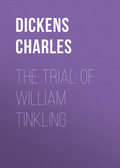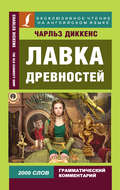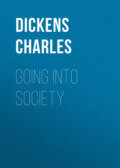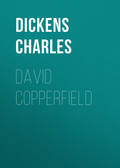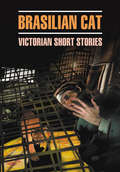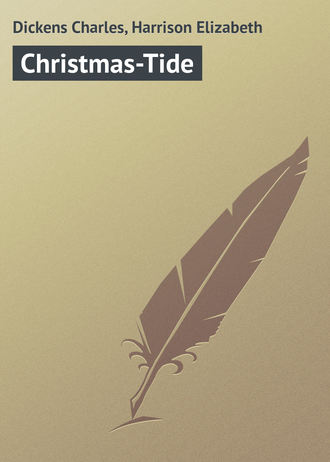
Чарльз Диккенс
Christmas-Tide
The clerk promised that he would; and Scrooge walked out with a growl. The office was closed in a twinkling, and the clerk, with the long ends of his white comforter dangling below his waist (for he boasted no greatcoat), went down a slide on Cornhill, at the end of a lane of boys, twenty times, in honor of its being Christmas Eve, and then ran home to Camden Town as hard as he could pelt, to play at blindman's-buff.
Scrooge took his melancholy dinner in his usual melancholy tavern; and having read all the newspapers, and beguiled the rest of the evening with his banker's-book, went home to bed. He lived in chambers which had once belonged to his deceased partner. They were a gloomy suite of rooms, in a lowering pile of building up a yard, where it had so little business to be that one could scarcely help fancying it must have run there when it was a young house, playing at hide-and-seek with other houses, and forgotten the way out again. It was old enough now, and dreary enough, for nobody lived in it but Scrooge, the other rooms being all let out as offices. The yard was so dark that even Scrooge, who knew its every stone, was fain to grope with his hands. The fog and frost so hung about the black old gateway of the house that it seemed as if the Genius of the Weather sat in mournful meditation on the threshold.
Now, it is a fact that there was nothing at all particular about the knocker on the door, except that it was very large. It is also a fact that Scrooge had seen it, night and morning, during his whole residence in that place; also that Scrooge had as little of what is called fancy about him as any man in the city of London, even including – which is a bold word – the corporation, aldermen, and livery. Let it also be borne in mind that Scrooge had not bestowed one thought on Marley since his last mention of his seven-years' dead partner that afternoon. And then let any man explain to me, if he can, how it happened that Scrooge, having his key in the lock of the door, saw in the knocker, without its undergoing any intermediate process of change – not a knocker, but Marley's face.
Marley's face. It was not in impenetrable shadow as the other objects in the yard were, but had a dismal light about it, like a bad lobster in a dark cellar. It was not angry or ferocious, but looked at Scrooge as Marley used to look, with ghostly spectacles turned up on its ghostly forehead. The hair was curiously stirred, as if by breath or hot air; and though the eyes were wide open, they were perfectly motionless. That, and its livid color, made it horrible; but its horror seemed to be in spite of the face and beyond its control, rather than a part of its own expression.
As Scrooge looked fixedly at this phenomenon, it was a knocker again.
To say that he was not startled, or that his blood was not conscious of a terrible sensation to which it had been a stranger from infancy, would be untrue. But he put his hand upon the key he had relinquished, turned it sturdily, walked in, and lighted his candle.
He did pause, with a moment's irresolution, before he shut the door; and he did look cautiously behind at first, as if he half-expected to be terrified with the sight of Marley's pigtail sticking out into the hall. But there was nothing on the back of the door, except the screws and nuts that held the knocker on, so he said, "Pooh, pooh!" and closed it with a bang.
The sound resounded through the house like thunder. Every room above, and every cask in the wine-merchant's cellars below, appeared to have a separate peal of echoes of its own. Scrooge was not a man to be frightened by echoes. He fastened the door and walked across the hall, and up the stairs, slowly too, trimming his candle as he went.
You may talk vaguely about driving a coach-and-six up a good old flight of stairs, or through a bad young act of Parliament; but I mean to say you might have got a hearse up that stair-case, and taken it broadwise, with the splinter-bar towards the wall and the door towards the balustrades, and done it easy. There was plenty of width for that, and room to spare; which is perhaps the reason why Scrooge thought he saw a locomotive hearse going on before him in the gloom. Half-a-dozen gas-lamps out of the street wouldn't have lighted the entry too well, so you may suppose that it was pretty dark with Scrooge's dip.
Up Scrooge went, not caring a button for that. Darkness is cheap, and Scrooge liked it. But before he shut his heavy door, he walked through his rooms to see that all was right. He had just enough recollection of the face to desire to do that.
Sitting-room, bedroom, lumber-room. All as they should be. Nobody under the table; nobody under the sofa; a small fire in the grate; spoon and basin ready; and the little sauce-pan of gruel (Scrooge had a cold in his head) upon the hob. Nobody under the bed; nobody in the closet; nobody in his dressing-gown, which was hanging up in a suspicious attitude against the wall. Lumber-room as usual. Old fire-guard, old shoes, two fish-baskets, washing-stand on three legs, and a poker.
Quite satisfied, he closed his door, and locked himself in; double-locked himself in, which was not his custom. Thus secured against surprise, he took off his cravat; put on his dressing-gown and slippers, and his night-cap, and sat down before the fire to take his gruel.
It was a very low fire indeed; nothing on such a bitter night. He was obliged to sit close to it, and brood over it before he could extract the least sensation of warmth from such a handful of fuel. The fireplace was an old one, built by some Dutch merchant long ago, and paved all round with quaint Dutch tiles, designed to illustrate the Scriptures. There were Cains and Abels, Pharaoh's daughters, Queens of Sheba, Angelic messengers descending through the air on clouds like feather-beds, Abrahams, Belshazzars, Apostles putting off to sea in butter-boats, hundreds of figures to attract his thoughts; and yet that face of Marley, seven years dead, came like the ancient Prophet's rod, and swallowed up the whole. If each smooth tile had been a blank at first, with power to shape some picture on its surface from the disjointed fragments of his thoughts, there would have been a copy of old Marley's head on every one.
"Humbug!" said Scrooge, and walked across the room.
After several turns, he sat down again. As he threw his head back in the chair, his glance happened to rest upon a bell, a disused bell that hung in the room, and communicated, for some purpose now forgotten, with a chamber in the highest story of the building. It was with great astonishment, and with a strange, inexplicable dread, that as he looked, he saw this bell begin to swing. It swung so softly in the outset that it scarcely made a sound, but soon it rang out loudly, and so did every bell in the house.
This might have lasted half a minute, or a minute, but it seemed an hour. The bells ceased as they had begun, together. They were succeeded by a clanking noise, deep down below, as if some person were dragging a heavy chain over the casks in the wine merchant's cellar. Scrooge then remembered to have heard that ghosts in haunted houses were described as dragging chains.
The cellar door flew open with a booming sound, and then he heard the noise much louder on the floors below; then coming up the stairs; then coming straight towards his door.
"It's humbug, still!" said Scrooge. "I won't believe it."
His color changed though, when, without a pause, it came on through the heavy door, and passed into the room before his eyes. Upon its coming in the dying flame leaped up, as though it cried, "I know him; Marley's Ghost!" and fell again.
The same face; the very same. Marley in his pigtail, usual waistcoat, tights, and boots; the tassels on the latter bristling, like his pigtail, and his coat-skirts, and the hair upon his head. The chain he drew was clasped about his middle. It was long, and wound about him like a tail; and it was made (for Scrooge observed it closely) of cash-boxes, keys, padlocks, ledgers, deeds, and heavy purses wrought in steel. His body was transparent: so that Scrooge, observing him, and looking through his waistcoat, could see the two buttons on his coat behind.
Scrooge had often heard it said that Marley had no bowels, but he had never believed it until now.
No, nor did he believe it even now. Though he looked the phantom through and through, and saw it standing before him, though he felt the chilling influence of his death-cold eyes, and marked the very texture of the folded 'kerchief bound about its head and chin, which wrapper he had not observed before, he was still incredulous, and fought against his senses.
"How now!" said Scrooge, caustic and cold as ever. "What do you want with me?"
"Much!" – Marley's voice, no doubt about it.
"Who are you?"
"Ask me who I was."
"Who were you, then?" said Scrooge, raising his voice. "You're particular, for a shade." He was going to say "to a shade," but substituted this, as more appropriate.
"In life I was your partner, Jacob Marley."
"Can you – can you sit down?" asked Scrooge, looking doubtfully at him.
"I can."
"Do it, then."
Scrooge asked the question because he didn't know whether a ghost so transparent might find himself in a condition to take a chair; and felt that in the event of its being impossible, it might involve the necessity of an embarrassing explanation. But the Ghost sat down on the opposite side of the fireplace, as if he were quite used to it.
"You don't believe in me," observed the Ghost.
"I don't," said Scrooge.
"What evidence would you have of my reality beyond that of your senses?"
"I don't know," said Scrooge.
"Why do you doubt your senses?"
"Because," said Scrooge, "a little thing affects them. A slight disorder of the stomach makes them cheats. You may be an undigested bit of beef, a blot of mustard, a crumb of cheese, a fragment of an underdone potato. There's more of gravy than of grave about you, whatever you are."
Scrooge was not much in the habit of cracking jokes, nor did he feel, in his heart, by any means waggish then. The truth is, that he tried to be smart, as a means of distracting his own attention and keeping down his terror; for the Specter's voice disturbed the very marrow in his bones.
To sit staring at those fixed, glazed eyes in silence for a moment would play, Scrooge felt, the very deuce with him. There was something very awful, too, in the Specter's being provided with an infernal atmosphere of its own. Scrooge could not feel it himself, but this was clearly the case; for though the Ghost sat perfectly motionless, its hair, and skirts, and tassels were still agitated as by the hot vapor from an oven.
"You see this toothpick?" said Scrooge, returning quickly to the charge, for the reason just assigned, and wishing, though it were only for a second, to divert the vision's stony gaze from himself.
"I do," replied the Ghost.
"You are not looking at it," said Scrooge.
"But I see it," said the Ghost, "notwithstanding."
"Well," returned Scrooge, "I have but to swallow this, and be for the rest of my days persecuted by a legion of goblins, all of my own creation. Humbug, I tell you! Humbug!"
At this the spirit raised a frightful cry, and shook its chain with such a dismal and appalling noise that Scrooge held on tight to his chair to save himself from falling in a swoon. But how much greater was his horror when the phantom taking off the bandage round its head, as if it were too warm to wear indoors, its lower jaw dropped down upon its breast!
Scrooge fell upon his knees, and clasped his hands before his face.
"Mercy!" he said. "Dreadful apparition, why do you trouble me?"
"Man of the worldly mind," replied the Ghost, "do you believe in me or not?"
"I do," said Scrooge. "I must. But why do spirits walk the earth, and why do they come to me?"
"It is required of every man," the Ghost returned, "that the spirit within him should walk abroad among his fellowmen, and travel far and wide; and if that spirit goes not forth in life, it is condemned to do so after death. It is doomed to wander through the world – oh, woe is me! – and witness what it cannot share, but might have shared on earth, and turned to happiness!"
Again the Specter raised a cry and shook its chain and wrung its shadowy hands.
"You are fettered," said Scrooge, trembling. "Tell me why?"
"I wear the chain I forged in life," replied the Ghost. "I made it link by link, and yard by yard; I girded it on of my own free will, and of my own free will I wore it. Is its pattern strange to you?"
Scrooge trembled more and more.
"Or would you know," pursued the Ghost, "the weight and length of the strong coil you bear yourself? It was full as heavy and as long as this seven Christmas Eves ago. You have labored on it since. It is a ponderous chain!"
Scrooge glanced about him on the floor, in the expectation of finding himself surrounded by some fifty or sixty fathoms of iron cable; but he could see nothing.
"Jacob," he said, imploringly, "old Jacob Marley, tell me more. Speak comfort to me, Jacob!"
"I have none to give," the Ghost replied. "It comes from other regions, Ebenezer Scrooge, and is conveyed by other ministers, to other kinds of men. Nor can I tell you what I would. A very little more is all permitted to me. I cannot rest, I cannot stay, I cannot linger anywhere. My spirit never walked beyond our counting-house – mark me! – in life my spirit never roved beyond the narrow limits of our money-changing hole, and weary journeys lie before me!"
It was a habit with Scrooge, whenever he became thoughtful, to put his hands in his breeches pockets. Pondering on what the Ghost had said, he did so now, but without lifting up his eyes or getting off his knees.
"You must have been very slow about it, Jacob," Scrooge observed, in a business-like manner, though with humility and deference.
"Slow!" the Ghost repeated.
"Seven years dead," mused Scrooge, "and traveling all the time!"
"The whole time," said the Ghost. "No rest, no peace. Incessant torture of remorse."
"You travel fast?" said Scrooge.
"On the wings of the wind," replied the Ghost.
"You might have got over a great quantity of ground in seven years," said Scrooge.
The Ghost, on hearing this, set up another cry, and clanked its chain so hideously in the dead silence of the night that the Ward would have been justified in indicting it for a nuisance.
"Oh, captive, bound and double-ironed!" cried the phantom, "not to know that ages of incessant labor, by immortal creatures, for this earth must pass into eternity before the good of which it is susceptible is all developed. Not to know that any Christian spirit working kindly in its little sphere, whatever it may be, will find its mortal life too short for its vast means of usefulness. Not to know that no space of regret can make amends for one life's opportunity misused! Yet such was I! Oh, such was I!"
"But you were always a good man of business, Jacob," faltered Scrooge, who now began to apply this to himself.
"Business!" cried the Ghost, wringing its hands again. "Mankind was my business. The common welfare was my business; charity, mercy, forbearance, and benevolence were all my business. The dealings of my trade were but a drop of water in the comprehensive ocean of my business!"
It held up its chain at arm's-length, as if that were the cause of all its unavailing grief, and flung it heavily upon the ground again.
"At this time of the rolling year," the Specter said, "I suffer most. Why did I walk through crowds of fellow-beings with my eyes turned down, and never raise them to that blessed Star which led the Wise Men to a poor abode! Were there no poor homes to which its light would have conducted me?"
Scrooge was very much dismayed to hear the Specter going on at this rate, and began to quake exceedingly.
"Hear me!" cried the Ghost. "My time is nearly gone."
"I will," said Scrooge. "But don't be hard upon me! Don't be flowery, Jacob, pray!"
"How it is that I appear before you in a shape that you can see, I may not tell. I have sat invisible beside you many and many a day."
It was not an agreeable idea. Scrooge shivered and wiped the perspiration from his brow.
"That is no light part of my penance," pursued the Ghost. "I am here to-night to warn you, that you have yet a chance and hope of escaping my fate. A chance and hope of my procuring, Ebenezer."
"You were always a good friend to me," said Scrooge. "Thank'ee!"
"You will be haunted," resumed the Ghost, "by three spirits."
Scrooge's countenance fell almost as low as the Ghost's had done.
"Is that the chance and hope you mentioned, Jacob?" he demanded, in a faltering voice.
"It is."
"I – I think I'd rather not," said Scrooge.
"Without their visits," said the Ghost, "you cannot hope to shun the path I tread. Expect the first to-morrow, when the bell tolls one."
"Couldn't I take 'em all at once and have it over, Jacob?" hinted Scrooge.
"Expect the second on the next night at the same hour. The third upon the next night when the last stroke of twelve has ceased to vibrate. Look to see me no more; and look that, for your own sake, you remember what has passed between us!"
When it had said these words the Specter took its wrapper from the table and bound it round its head as before. Scrooge knew this by the smart sound its teeth made when the jaws were brought together by the bandage. He ventured to raise his eyes again, and found his supernatural visitor confronting him in an erect attitude, with its chain wound over and about its arm.
The apparition walked backward from him and at every step it took the window raised itself a little, so that when the Specter reached it, it was wide open.
It beckoned Scrooge to approach which he did. When they were within two paces of each other, Marley's Ghost held up its hand, warning him to come no nearer. Scrooge stopped.
Not so much in obedience as in surprise and fear; for on the raising of the hand, he became sensible of confused noises in the air; incoherent sounds of lamentation and regret; wailings inexpressibly sorrowful and self-accusatory. The Specter, after listening for a moment, joined in the mournful dirge, and floated out upon the bleak, dark night.
Scrooge followed to the window, desperate in his curiosity. He looked out.
The air was filled with phantoms, wandering hither and thither in restless haste, and moaning as they went. Every one of them wore chains like Marley's Ghost; some few (they might be guilty governments) were linked together; none were free. Many had been personally known to Scrooge in their lives. He had been quite familiar with one old ghost in a white waistcoat, with a monstrous iron safe attached to its ankle, who cried piteously at being unable to assist a wretched woman with an infant, whom it saw below, upon a door-step. The misery with them all was clearly that they sought to interfere, for good, in human matters, and had lost the power forever.
Whether these creatures faded into mist, or mist enshrouded them, he could not tell. But they and their spirit voices faded together, and the night became as it had been when he walked home.
Scrooge closed the window, and examined the door by which the Ghost had entered. It was double-locked, as he had locked it with his own hands, and the bolts were undisturbed. He tried to say "Humbug!" but stopped at the first syllable. And being – from the emotion he had undergone, or the fatigues of the day, or his glimpse of the invisible world, or the dull conversation of the Ghost, or the lateness of the hour – much in need of repose, went straight to bed without undressing, and fell asleep upon the instant.
STAVE TWO
THE FIRST OF THE THREE SPIRITS
When Scrooge awoke it was so dark that, looking out of bed, he could scarcely distinguish the transparent window from the opaque walls of his chamber. He was endeavoring to pierce the darkness with his ferret eyes when the chimes of a neighboring church struck the four quarters. So he listened for the hour.
To his great astonishment the heavy bell went on from six to seven, and from seven to eight, and regularly up to twelve; then stopped. Twelve! It was past two when he went to bed. The clock was wrong. An icicle must have got into the works. Twelve!
He touched the spring of his repeater to correct this most preposterous clock. Its rapid little pulse beat twelve, and stopped.
"Why, it isn't possible," said Scrooge, "that I can have slept through a whole day and far into another night. It isn't possible that anything has happened to the sun, and this is twelve at noon!"
The idea being an alarming one, he scrambled out of bed, and groped his way to the window. He was obliged to rub the frost off with the sleeve of his dressing-gown before he could see anything; and could see very little then. All he could make out was, that it was still very foggy and extremely cold, and that there was no noise of people running to and fro, and making a great stir, as there unquestionably would have been if night had beaten off bright day and taken possession of the world. This was a great relief, because "three days after sight of this First of Exchange pay to Mr. Ebenezer Scrooge or his order," and so forth, would have become a mere United States' security if there were no days to count by.
Scrooge went to bed again and thought and thought, and thought it over and over and over, and could make nothing of it. The more he thought, the more perplexed he was; and the more he endeavored not to think, the more he thought.
Marley's Ghost bothered him exceedingly. Every time he resolved within himself, after mature inquiry, that it was all a dream, his mind flew back again, like a strong spring released to its first position, and presented the same problem to be worked all through, "Was it a dream or not?"
Scrooge lay in this state until the chime had gone three-quarters more, when he remembered, on a sudden, that the Ghost had warned him of a visitation when the bell tolled one. He resolved to lie awake until the hour was passed; and considering that he could no more go to sleep than go to heaven, this was perhaps the wisest resolution in his power.
The quarter was so long that he was more than once convinced he must have sunk into a doze unconsciously, and missed the clock. At length it broke upon his listening ear.
"Ding, dong!"
"A quarter past," said Scrooge, counting.
"Ding, dong!"
"Half-past!" said Scrooge.
"Ding, dong!"
"A quarter to it," said Scrooge.
"Ding, dong!"
"The hour itself," said Scrooge, triumphantly, "and nothing else!"
He spoke before the hour bell sounded, which it now did with a deep, dull, hollow, melancholy ONE. Light flashed up in the room upon the instant, and the curtains of his bed were drawn.
The curtains of his bed were drawn aside, I tell you, by a hand. Not the curtains at his feet, nor the curtains at his back, but those to which his face was addressed. The curtains of his bed were drawn aside; and Scrooge, starting up into a half-recumbent attitude, found himself face to face with the unearthly visitor who drew them, as close to it as I am now to you, and I am standing in the spirit at your elbow.
It was a strange figure – like a child; yet not so like a child as like an old man, viewed through some supernatural medium, which gave him the appearance of having receded from the view, and being diminished to a child's proportions. Its hair, which hung about its neck and down its back, was white as if with age; and yet the face had not a wrinkle in it, and the tenderest bloom was on the skin. The arms were very long and muscular; the hands the same, as if its hold were of uncommon strength. Its legs and feet, most delicately formed, were, like those upper members, bare. It wore a tunic of the purest white; and round its waist was bound a lustrous belt, the sheen of which was beautiful. It held a branch of fresh, green holly in its hand, and in singular contradiction of that wintry emblem, had its dress trimmed with summer flowers. But the strangest thing about it was, that from the crown of its head there sprung a bright, clear jet of light, by which all this was visible; and which was doubtless the occasion of its using, in its duller moments, a great extinguisher for a cap, which it now held under its arm.
Even this, though, when Scrooge looked at it with increasing steadiness, was not its strangest quality. For as its belt sparkled and glittered now in one part and now in another, and what was light one instant, at another time was dark, so the figure itself fluctuated in its distinctness; being now a thing with one arm, now with one leg, now with twenty legs, now a pair of legs without a head, now a head without a body, of which dissolving parts no outline would be visible in the dense gloom wherein they melted away. And in the very wonder of this, it would be itself again; distinct and clear as ever.
"Are you the Spirit, sir, whose coming was foretold to me?" asked Scrooge.
"I am!"
The voice was soft and gentle. Singularly low, as if, instead of being so close beside him, it were at a distance.
"Who and what are you?" Scrooge demanded.
"I am the Ghost of Christmas Past."
"Long past?" inquired Scrooge, observant of its dwarfish stature.
"No; your past."
Perhaps Scrooge could not have told anybody why if anybody could have asked him, but he had a special desire to see the Spirit in his cap, and begged him to be covered.
"What!" exclaimed the Ghost, "would you so soon put out, with worldly hands, the light I give? Is it not enough that you are one of those whose passions made this cap, and force me through whole trains of years to wear it low upon my brow!"
Scrooge reverently disclaimed all intention to offend or any knowledge of having willfully "bonneted" the Spirit at any period of his life. He then made bold to inquire what business brought him there.
"Your welfare!" said the Ghost.
Scrooge expressed himself much obliged, but could not help thinking that a night of unbroken rest would have been more conducive to that end. The Spirit must have heard him thinking, for it said immediately, "Your reclamation, then. Take heed!"
It put out its strong hand as it spoke, and clasped him gently by the arm.
"Rise, and walk with me!"
It would have been in vain for Scrooge to plead that the weather and the hour were not adapted to pedestrian purposes; that the bed was warm, and the thermometer a long way below freezing; that he was clad but lightly in his slippers, dressing-gown, and night-cap; and that he had a cold upon him at that time. The grasp, though gentle as a woman's hand, was not to be resisted. He rose; but finding that the Spirit made towards the window, clasped his robe in supplication.
"I am a mortal," Scrooge remonstrated, "and liable to fall."
"Bear but a touch of my hand there," said the Spirit, laying it upon his heart, "and you shall be upheld in more than this!"
As the words were spoken, they passed through the wall, and stood upon an open country road, with fields on either hand. The city had entirely vanished. Not a vestige of it was to be seen. The darkness and the mist had vanished with it, for it was a clear, cold, winter day, with snow upon the ground.
"Good heaven!" said Scrooge, clasping his hands together as he looked about him. "I was bred in this place. I was a boy here!"
The Spirit gazed upon him mildly. Its gentle touch, though it had been light and instantaneous, appeared still present to the old man's sense of feeling. He was conscious of a thousand odors floating in the air, each one connected with a thousand thoughts, and hopes, and joys, and cares, long, long forgotten!
"Your lip is trembling," said the Ghost. "And what is that upon your cheek?"
Scrooge muttered, with an unusual catching in his voice, that it was a pimple; and begged the Ghost to lead him where he would.
"You recollect the way?" inquired the Spirit.
"Remember it!" cried Scrooge, with fervor; "I could walk it blindfold."
"Strange to have forgotten it for so many years!" observed the Ghost. "Let us go on."
They walked along the road. Scrooge recognizing every gate, and post, and tree, until a little market-town appeared in the distance, with its bridge, its church, and winding river. Some shaggy ponies now were seen trotting towards them with boys upon their backs, who called to other boys in country gigs and carts, driven by farmers. All these boys were in great spirits, and shouted to each other, until the broad fields were so full of merry music that the crisp air laughed to hear it.
"These are but shadows of the things that have been," said the Ghost. "They have no consciousness of us."
The jocund travelers came on; and as they came, Scrooge knew and named them every one. Why was he rejoiced beyond all bounds to see them! Why did his cold eye glisten, and his heart leap up as they went past! Why was he filled with gladness when he heard them give each other Merry Christmas, as they parted at cross-roads and by-ways, for their several homes! What was merry Christmas to Scrooge? Out upon merry Christmas! What good had it ever done to him?
"The school is not quite deserted," said the Ghost. "A solitary child, neglected by his friends, is left there still."
Scrooge said he knew it. And he sobbed.
They left the high-road by a well-remembered lane and soon approached a mansion of dull red brick, with a little weather-cock-surmounted cupola on the roof, and a bell hanging in it. It was a large house, but one of broken fortunes, for the spacious offices were little used, their walls were damp and mossy, their windows broken, and their gates decayed. Fowls clucked and strutted in the stables, and the coach-houses and sheds were overrun with grass. Nor was it more retentive of its ancient state within; for entering the dreary hall, and glancing through the open doors of many rooms, they found them poorly furnished, cold, and vast. There was an earthy savor in the air, a chilly bareness in the place, which associated itself somehow with too much getting up by candle-light, and not too much to eat.



